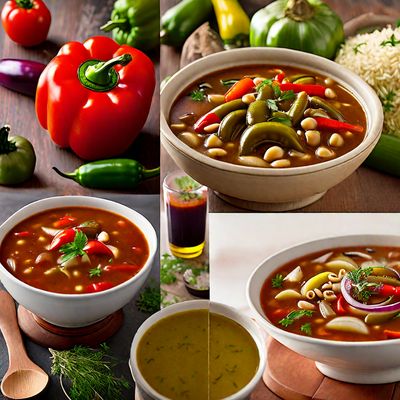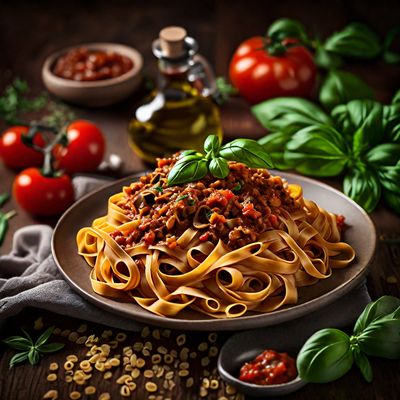
Cuisine
Mediterranean cuisine
Mediterranean cuisine is heavily influenced by the region's geography and climate. The warm, sunny climate and fertile soil provide an abundance of fresh produce, while the Mediterranean Sea provides an abundance of seafood. Traditional dishes include pasta dishes, paella (a rice dish with seafood and vegetables), and moussaka (a Greek dish with eggplant and ground meat). Modern Mediterranean cuisine has been influenced by international trends, but still emphasizes local and seasonal ingredients.
Typical ingredients
Fish (tuna, sardines, anchovies), Tomatoes, Olives, Olive oil, Garlic, Onions, Eggplant, Zucchini, Peppers, Herbs (basil, oregano, thyme), Lamb, Chicken
Presentation and garnishing
Mediterranean cuisine is often presented in a simple and rustic manner, with an emphasis on natural flavors and textures. Garnishes are typically minimal, with fresh herbs or olives used sparingly.
Mediterranean cuisine has influenced many other cuisines around the world, and is known for its emphasis on fresh, simple ingredients and bold flavors.
More cuisines from this region...
Spanish cuisine, Italian cuisine, Turkish cuisine, Portuguese cuisine, Balkan cuisine, Maltese cuisine, Cypriot cuisine, Sammarinese cuisine, Gibraltarian cuisine
History
Mediterranean cuisine has a long history dating back thousands of years. The region has been a crossroads of cultures and civilizations, resulting in a cuisine that is rich and diverse. The ancient Greeks and Romans were known for their love of food and wine, and many of their culinary traditions have been passed down to modern times. Today, Mediterranean cuisine is a blend of traditional and modern influences.
Cultural significance
Mediterranean cuisine is an important part of the region's cultural heritage. Traditional dishes are often served on special occasions and holidays, and many families have their own recipes that have been passed down for generations. The use of local and seasonal ingredients is also an important aspect of Mediterranean cuisine.
Health benefits and considerations
Mediterranean cuisine is known for its health benefits, as it emphasizes fresh, whole foods and healthy fats like olive oil. The Mediterranean diet has been linked to a reduced risk of heart disease, stroke, and other chronic diseases. However, some traditional Mediterranean dishes are high in salt and fat, so should be consumed in moderation.
Mediterranean cuisine recipes Browse all »

Mediterranean Chicken Soup
Savor the Mediterranean Flavors with this Hearty Chicken Soup

Tacos al Pastor with a Mediterranean Twist
Mediterranean-inspired Tacos al Pastor: A Fusion of Flavors

Mediterranean Baklava
Layers of Sweetness: Mediterranean Baklava Delight

Mediterranean Gumbo
A Fusion of Flavors: Mediterranean Gumbo Delight

Mediterranean-style Grilled Ribs
Sizzling Mediterranean Ribs with a Tangy Twist

Mediterranean-style Spring Rolls
Sun-kissed Spring Rolls: A Mediterranean Twist on a Classic Chinese Dish

Tagliatelle al ragù alla Bolognese
Mediterranean Twist: Tagliatelle with Mediterranean-style Bolognese

Mediterranean Coq au Vin
Sun-Kissed Chicken in Red Wine Sauce

Mediterranean Cheesesteak
Feta-filled Cheesesteak with Roasted Red Peppers

Mediterranean Murgh Malai
Creamy Mediterranean Chicken

Mediterranean Şakşuka
Sun-Kissed Vegetable Delight: Mediterranean Şakşuka

Mediterranean Gyros
Savor the Flavors of the Mediterranean with Delicious Gyros